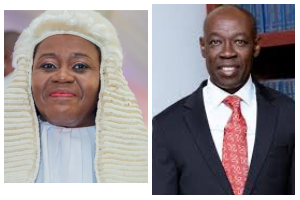The Ghana Voice,
Accra, Ghana

“My Lady, the Law is Supreme Too”: Lawyer Sory Punches Holes in Chief Justice Torkornoo’s Statement
The Ghana Voice 26-06-2025In what many are calling a sharp and sobering legal rebuttal, renowned lawyer Thaddeus Sory, lead counsel for the petitioners seeking the removal of Ghana’s Chief Justice, has responded with biting clarity to Justice Gertrude Sackey Torkornoo’s emotional national address. His statement, titled “She Said, We Say”, challenges the Chief Justice’s claims of procedural injustice and constitutional violations, arguing that her public plea is more political than legal.
Mr. Sory begins his critique with a reminder that Ghana’s legal history is not a blank slate. “We need no education,” he insists, pointing to previous Article 146 proceedings against notable figures such as former EC Chair Charlotte Osei and other superior court justices. The Chief Justice's assertion that her case "ripples beyond her as a person" was, to him, a well-worn argument already addressed by ample legal precedent.
A major pillar of the Chief Justice’s complaint was her request for a public hearing—a request the Supreme Court rejected. But Mr. Sory questions why a jurist of her stature would even make such a request when, he says, the Constitution and at least three Supreme Court rulings have consistently mandated that Article 146 hearings be held in camera. “How could a whole Chief Justice not know this?” he asks rhetorically, citing Justice Dery v Tiger Eye PI and Agyei Twum v Attorney-General among others.
He didn’t stop there. Responding to her lament about the striking out of her supplementary affidavit, Sory called it hypocritical, reminding her that she herself had once struck out an affidavit in the LGBTQI+ parliamentary case without citing any specific offending content. “Has she so soon forgotten?” he asks, with legal sarcasm cutting deeper than most political barbs.
The lawyer also found fault with the Chief Justice’s accusations that the committee had not properly disclosed the specific allegations for which a prima facie case was determined. “What then did she respond to in her earlier submissions?” he questions, implying that the Chief Justice is conveniently ignoring her own earlier participation in the process.
Even more concerning for Mr. Sory was what he called the Chief Justice’s “misunderstanding” of basic legal concepts. He reminded her that petitioners are not obligated to testify—another settled point in Ghanaian case law. He referenced precedents like Nyame v Ansah and In Re Ashale Botwe, which affirm that parties cannot be compelled to take the stand in their own case.
On the issue of her husband being denied access to the hearing room, Sory dismissed the complaint as unfounded and unprecedented. “She should point to any prior Article 146 proceeding where the respondent was allowed to be accompanied by family,” he said. In his view, the Chief Justice is seeking courtesies that have never been granted in such proceedings.
He also shot down the Chief Justice’s concern about the venue of the hearings, pointing out that all previous hearings were held under her administration—not hers as the subject. “This is different,” he said, implying that her role has changed and so have the rules that apply.
Mr. Sory reserved some of his strongest words for her supposed conflation of Article 146 proceedings with traditional judicial processes. “Does our Chief Justice not even know that Article 146 proceedings are inquisitorial, not adversarial?” he queried, adding that the committee in question is not a court of law but a fact-finding body.
The lawyer was also incredulous at the Chief Justice’s complaint that she had not been given copies of the petitions. “What then did she respond to that resulted in the prima facie determination?” he asked, drawing attention to a contradiction in her narrative.
In perhaps his most biting observation, Sory criticized her claim that the petitions needed to be admitted into evidence for the process to be valid. “Even in court,” he said, “pleadings are not admitted into evidence in order to validate a trial.” He used this to question whether Ghana’s top judge truly grasps the basic principles that govern the system she oversees.
One of the most crucial legal points Mr. Sory raised was about procedure. He argued that the Chief Justice misapplied the Commissions of Inquiry (Practice and Procedure) Rules, 2010 (C.I. 65), by suggesting they apply to the Article 146 process. “Did she not read the definition section?” he asked. He reminded her that the Supreme Court in the Agyei Twum case clearly stated that Article 146 Committees are ad hoc in nature and determine their own procedures.
Ultimately, Mr. Sory questioned whether the Chief Justice’s statement was more about salvaging public sympathy than upholding judicial integrity. “Her suggestion that without her there can be no justice is betrayed by her own words,” he wrote, summing up his concern that Ghana’s Chief Justice may be placing herself above the very system she once served.
In a democracy where the rule of law must remain sacrosanct, the clash between a Chief Justice and the very legal mechanisms she once championed is both unsettling and unprecedented.
